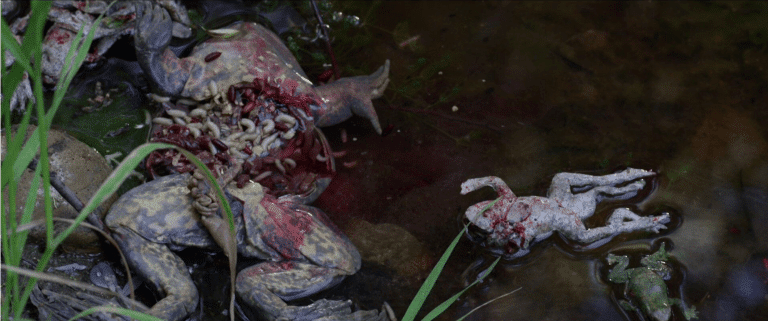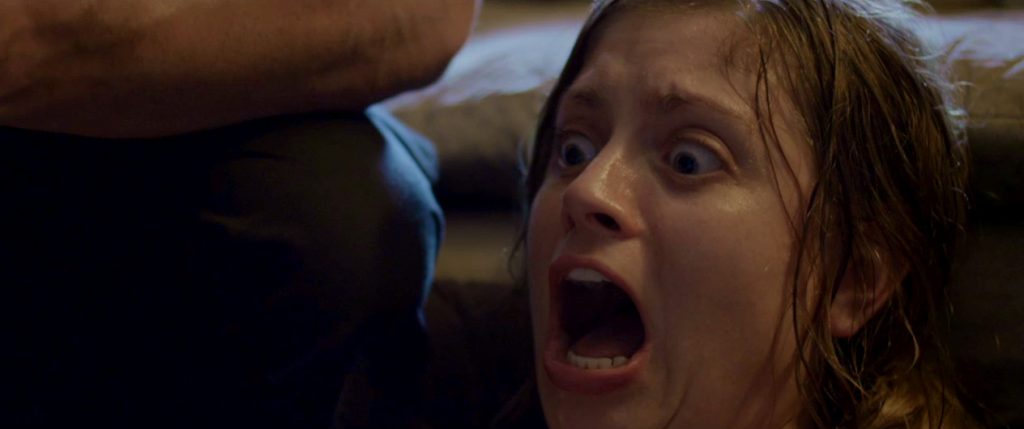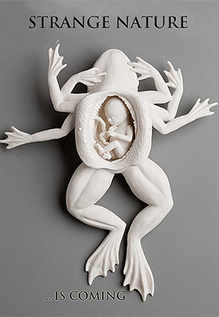 There have been many horror films about environmental havoc over the years, but it seems as though frogs have not figured prominently in these. Aside from the game-changing (or even life-changing) Hell Comes to Frogtown and a short cameo in Baskin, frogs have been largely overlooked, so I’ll admit: the press information for Strange Nature won me over via its apparent novelty, speaking of mutant frogs and the like. It’s possibly strange that we’ve seen so few amphibians in horror cinema; frogs have to live with us, have to cope with whatever we flush into the water, and their habitat has an immediate effect on them. This brings us to rural Minnesota, where the story begins.
There have been many horror films about environmental havoc over the years, but it seems as though frogs have not figured prominently in these. Aside from the game-changing (or even life-changing) Hell Comes to Frogtown and a short cameo in Baskin, frogs have been largely overlooked, so I’ll admit: the press information for Strange Nature won me over via its apparent novelty, speaking of mutant frogs and the like. It’s possibly strange that we’ve seen so few amphibians in horror cinema; frogs have to live with us, have to cope with whatever we flush into the water, and their habitat has an immediate effect on them. This brings us to rural Minnesota, where the story begins.
We’re introduced to some of our key characters, mother Kim (Lisa Sheridan) and sulky pre-teen son Brody (Jonah Beres). Mother and son are heading to Tuluth, Minnesota to look after her ailing father Chuck (Bruce Bohne), and son is sulky because he doesn’t much fancy living somewhere which has no indoor toilet, let alone Wi-Fi. Conditions at their new home are therefore understandably basic, though the surrounding farmland is beautiful, and attractive to wildlife photographers. Such as Lisa (Tiffany Shepis) who soon encounters what sounds like a large, disgruntled critter (which, sadly, we never see). Brady and Kim soon find that lots of the frogs in the area are oddly mutated, with additional limbs, and they begin to ask why – at around the same time as people begin to go missing. Thus the scene is set for nature to give these folks a kicking, with Kim now in a new starring role as environmental investigator.
 The film at this juncture could have gone, to my mind, in one of two ways. Either it could have gone all out with glorious excess, using its environmental theme as an excuse to hurl froggy gore at the screen, or else elected to look quite seriously at the topic of pollution and its aftermath. Perhaps surprisingly, at least to my mind, the film largely opts for the latter. This is a very script-heavy film with a lot of dialogue employed to develop character and motivation, though thanks to this it feels a little slow in the middle act, and after Tiffany Shepis departs proceedings very early (she’s criminally underused here, and generally deserves more appreciation for sheer work ethic alone) it feels as though we’ve just been tantalised with the promise of some huge aggressive monster-creature. Instead, Kim is all about exorcising her demons as a former pop singer who made the mistake of insulting the denizens of Tuluth before heading off to a better life, and so she ends up working with the local elementary school science teacher to understand the situation and hopefully alert the locals to what’s happening before it’s Too Late.
The film at this juncture could have gone, to my mind, in one of two ways. Either it could have gone all out with glorious excess, using its environmental theme as an excuse to hurl froggy gore at the screen, or else elected to look quite seriously at the topic of pollution and its aftermath. Perhaps surprisingly, at least to my mind, the film largely opts for the latter. This is a very script-heavy film with a lot of dialogue employed to develop character and motivation, though thanks to this it feels a little slow in the middle act, and after Tiffany Shepis departs proceedings very early (she’s criminally underused here, and generally deserves more appreciation for sheer work ethic alone) it feels as though we’ve just been tantalised with the promise of some huge aggressive monster-creature. Instead, Kim is all about exorcising her demons as a former pop singer who made the mistake of insulting the denizens of Tuluth before heading off to a better life, and so she ends up working with the local elementary school science teacher to understand the situation and hopefully alert the locals to what’s happening before it’s Too Late.
Gradually, Strange Nature becomes less about frogs and more about general mutation issues, as the pollution problem seems to be affecting people too. Plot-wise, there’s a hint at something a little like schistosomiasis, but I was largely put in mind of The Bay, with whatever’s in the water now extending its reach to the human population. The tone stays serious throughout, though the film does save some practical effects for the final act. There are ideas here, and some of the special effects scenes are quite imaginative, but it doesn’t quite feel like a pay-off. Also, does every indie filmmaker use the same audio library? There’s a baby crying in this film which feels like the most familiar baby’s cry in the world, having been used on Tool’s album Aenima and, it seems, in every low-budget film since. That ‘baby’ could be a parent themselves by now.
Everyone is very much in earnest in Strange Nature, and the film quite fairly endeavours to make serious points about our impact upon the natural world, perhaps wisely realising that a full-on approach with everything alluded to appearing on screen would be costly and difficult to achieve. The emphasis is very much on the people affected by this story accordingly, and I suppose you do in the end feel that the key characters have been on the proverbial ‘journey’, so in that respect Strange Nature does what it sets out to do. This doesn’t grant us a high-action film, however, and it does feel as though the film lacks some punching power, holding back its horror elements until the bitter end, which is a little frustrating. Still, the film does have noble aims, even if it ultimately gets there by less than perfect means. This is after all James Ojala’s first feature-length offering, and after honing his skills in a number of different roles in filmmaking, I’m sure there’s lots more to come from him yet.
